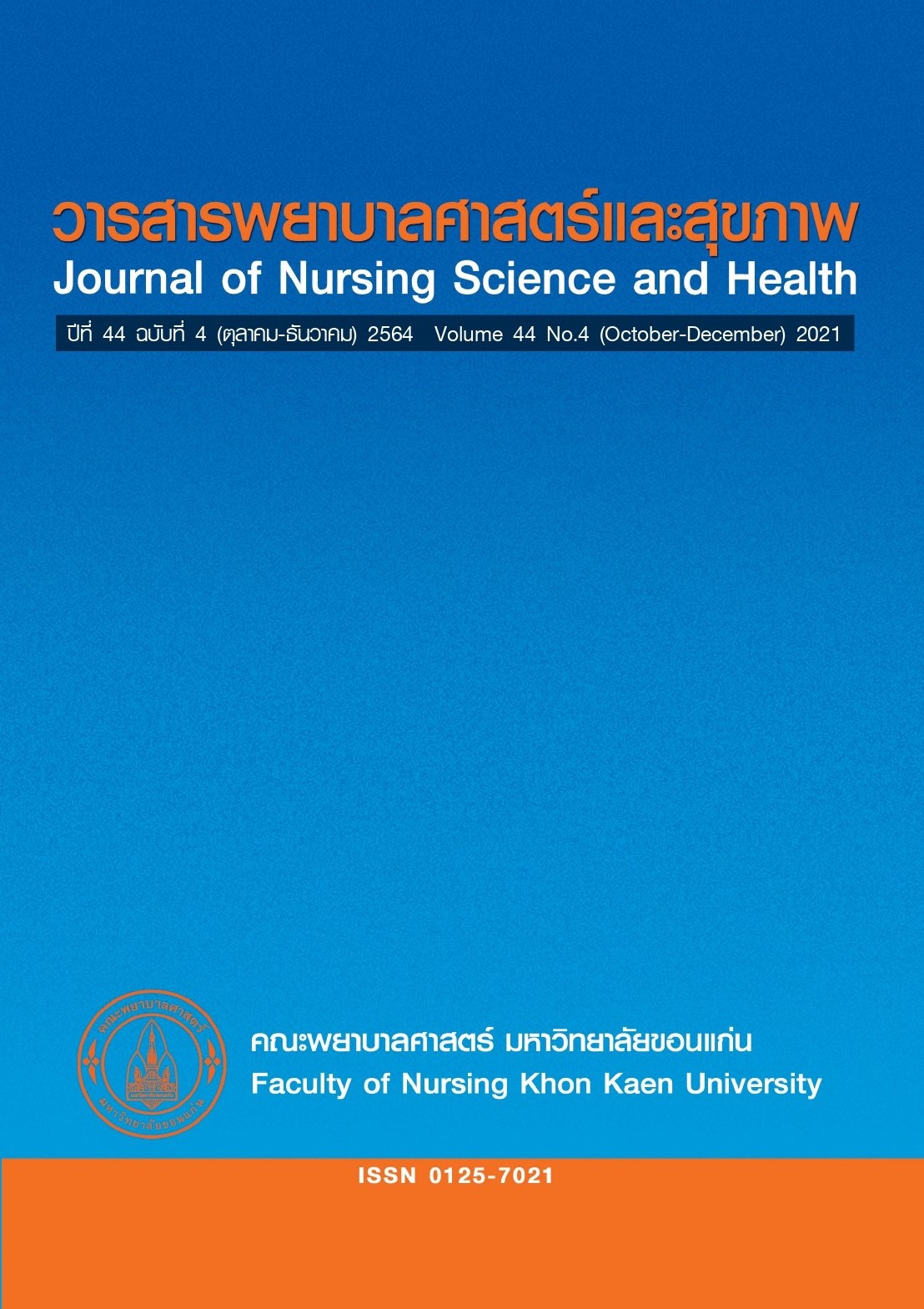ปัจจัยทำนายการเกิดภาวะเม็ดเลือดขาวชนิดนิวโทรฟีลต่ำในผู้ป่วยมะเร็งที่ได้รับเคมีบำบัดสูตร FOLFOX 4
คำสำคัญ:
ภาวะเม็ดเลือดขาวชนิดนิวโทรฟีลต่ำ, ผู้ป่วยมะเร็ง, เคมีบำบัดสูตร FOLFOX 4บทคัดย่อ
การศึกษาครั้งนี้เป็นการศึกษาความสัมพันธ์เชิงทำนาย มีวัตถุประสงค์เพื่อศึกษาปัจจัยทำนายการเกิดภาวะเม็ดเลือดขาวชนิดนิวโทรฟีลต่ำ ในผู้ป่วยมะเร็งที่ได้รับเคมีบำบัดสูตร FOLFOX 4 กลุ่มตัวอย่างเป็นผู้ป่วยมะเร็งที่ได้รับเคมีบำบัดสูตร FOLFOX 4 จำนวน 76 ราย ที่มารับบริการที่โรงพยาบาลระดับตติยภูมิแห่งหนึ่ง ในจังหวัดขอนแก่น รวบรวมข้อมูลโดยใช้แบบบันทึกข้อมูลส่วนบุคคล และแบบบันทึกข้อมูลปัจจัยเสี่ยงต่อการเกิดภาวะเม็ดเลือดขาวชนิดนิวโทรฟีลต่ำ วิเคราะห์ข้อมูลโดยใช้สถิติพรรณนาและสถิติวิเคราะห์การถดถอยโลจีสติค
ผลการศึกษาพบว่า กลุ่มตัวอย่างร้อยละ 50 เกิดภาวะเม็ดเลือดขาวชนิดนิวโทรฟีลต่ำ จำนวนรอบที่ได้รับเคมีบำบัดที่เกิดภาวะเม็ดเลือดขาวชนิดนิวโทรฟีลต่ำมากที่สุดคือรอบที่ 3 ปัจจัยที่มีความสัมพันธ์กับการเกิดภาวะเม็ดเลือดขาวชนิดนิวโทรฟีลต่ำ ได้แก่ อายุ ดัชนีมวลกาย การได้รับเคมีบำบัดเพิ่มขึ้นทุก 1 รอบ และประวัติการเกิดภาวะเม็ดเลือดขาวชนิดนิวโทรฟีลต่ำ ส่วนปัจจัยที่สามารถทำนายการเกิดภาวะเม็ดเลือดขาวชนิดนิวโทรฟีลต่ำ ได้แก่ อายุ 65 ปีขึ้นไป (OR = 37.31, 95% CI = 4.02 – 346.75) การได้รับเคมีบำบัดเพิ่มขึ้น 1 รอบมีโอกาสเสี่ยงต่อการเกิดภาวะ neutropenia ลดลงร้อยละ 61 (OR = 0.39, 95% CI = 0.23-0.65) และประวัติเกิดภาวะเม็ดเลือดขาวชนิดนิวโทรฟีลต่ำ (OR = 37.14, 95% CI = 4.39 – 314.67) คมีบำบัดบัดะบัณฑิตศึกษา ๖ผลจากการศึกษาครั้งนี้สามารถนำไปใช้เป็นแนวทางในการดูแลเกี่ยวกับการเฝ้าระวังความเสี่ยงและการดูแลเพื่อป้องกันภาวะแทรกซ้อน รวมทั้งการป้องกันการเกิดภาวะเม็ดเลือดขาวชนิดนิวโทรฟีลต่ำซ้ำในผู้ป่วยมะเร็งได้รับเคมีบำบัดสูตร FOLFOX 4
เอกสารอ้างอิง
Smoragiewicz M, Javaheri KR, Yin Y, Gill S. Neutropenia and relative dose intensity on adjuvant FOLFOX chemotherapy are not associated with survival for resected colon cancer. J Gastrointest Cancer 2014; 45(4): 460–5.
Hecht JR, Pillai M, Gollard R, Heim W, Swan F, Patel R, et al. A randomized, placebo-controlled phase Ii study evaluating the reduction of neutropenia and febrile neutropenia in patients with colorectal cancer receiving pegfilgrastimwithevery-2-weekchemotherapy. Clin Colorectal Cancer [Internet]. 2010; 9(2): 95-101.doi:10.3816/CCC.2010.n.013
Pinter T, Klippel Z, Cesas A, Croitoru A, Decaestecker J, Gibbs P, et al. A phase III, randomized, double-blind, placebo-controlled trial of pegfilgrastim in patients receiving first-line FOLFOX/bevacizumab or FOLFIRI/bevacizumab for locally advanced or metastatic colorectal cancer: Final results of the pegfilgrastim and anti-v. Clin Colorectal Cancer [Internet]. 2017; 16(2): 103–14. Available from: http://dx.doi.org/ 10.1016/j.clcc.2016.08.008
Sankoson N. Chemotherapy dosing in special populations: Amputees and obese patients: [Internet]. Khon Kaen: Bangkok Hospital Khon Kaen; 2019 [cited 2019 Jul]. Available from:https://ccpe.pharmacycouncil.org/index. php?option=articledetail& subpage=article_ detail&id=402. (in Thai)
HaghighiS, Kasbkar H, Esmaeilpour K, Yasaei M. Oxaliplatin, 5-fluorouracil and leucovorin (FOLFOX-4) as first line chemotherapy in elderly patients with advanced gastric cancer. Asian Pacific J Cancer Prev 2016; 17(7): 3277–80.
Hong YS, Nam BH, Kim K pyo, Kim JE, Park SJ, Park YS, et al. Oxaliplatin, fluorouracil, and leucovorin versus fluorouracil and leucovorin as adjuvant chemotherapy for locally advanced rectal cancer after preoperative chemoradiotherapy (ADORE): Anopen-label, multicentre, phase 2, randomised controlled trial. Lancet Oncol [Internet]. 2014; 15(11): 1245–53. Available from: http://dx.doi.org/10.1016/ S1470-2045(14)70377-8.
Qin S, Gong X. Progression of systemic chemotherapy with oxaliplatin-containing regimens for advanced hepatocellular carcinoma in China. Hepatic Oncol 2016; 3(1): 71–81.
Zhao L, Liu R, Zhang Z, Li T, Li F, Liu H, et al. Oxaliplatin/fluorouracil-based adjuvant chemotherapy for locally advanced rectal cancer after neoadjuvant chemoradiotherapy and surgery: A systematic review and meta-analysis of randomized controlled trials. Color Dis 2016; 18(8): 763–72.
Thavichaigarn P. Cancer of colon, rectum and anus. Bankok: Saiturakit Publishing; 2011. (in Thai)
Chu-Yuan H, Jing P, Yi-Sheng W, He-Ping P, Hui Y, Chu-Xiong Z, et al. The impact of chemotherapy-associated neutrophil/lymphocyte counts on prognosis of adjuvant chemotherapy in colorectal cancer. BMC Cancer 2013; 13(177): 1-10.
Schwenkglenks M, Pettengell R, Jackisch C, Paridaens R, Constenla M, Bosly A, et al. Risk factors for chemotherapy-induced neutropenia occurrence in breast cancer patients: Data from the INC-EU prospective observational European neutropenia study. Support Care Cancer 2011; 19(4): 483–90.
Abd el-Rahm an O. Impact of sex on chemotherapy toxicity and efficacy among patients with metastatic colorectal cancer: Pooled analysis of 5 randomized trials. Clin Colorectal Cancer [Internet]. 2019; 18(2): 110-5.e2. Available from: https://doi.org/10. 1016/j.clcc.2018.12.006
Dehghani M, Hafezi N, Vojdani R, Ramzi M. Hematologic toxicities in colorectal cancer patients who received FOLFOX 4. Middle East J Cancer 2015; 6(3): 171-7.
Takenaka Y, Cho H, Yamamoto M, Nakahara S, Yamamoto Y, Inoharaet H. Incidence and predictors of febrile neutropenia during chemotherapy in patients with head and neck cancer. Supportive care in cancer: Official Journal of the Multinational Association of Supportive Care in Cancer 2013 21(10): 2861-8. DOI: 10.1007/s00520-013- 1873-9.
Hacibekiroglu I, Kodaz H, Erdogan B, Turkmen E, Esenkaya A, Uzunoglu S, et al. Comparative analysis of the efficacy and safety of oxaliplatin plus 5-fluorouracil/leucovorin (modified folfox6) with advanced gastric cancer patients having a good or poor performance status. Asian Pacific J CancerPrev 2015; 16(6): 2355–9.
Chen C, Chan A, Yap K. Visualizing clinical predictors of febrile neutropenia in Asian cancer patients receiving myelosuppressive chemotherapy. J Oncol Pharm Pract 2013; 19(2): 111–20.
Seo SH, Kim S, Kang Y, Ryoo B, Ryu M, Jeong JH. Association of nutritional status-related indices and chemotherapy-induced adverse events in gastric cancer patients. BMC Cancer [Internet]. 2016; 1–9. Available from: http:// dx.doi.org/10.1186/s12885-016-2934-5.
Ratanabunjerdkul H. Association between hypoalbuminemia and severe neutropenia following the first cycle chemotherapy in breast cancer patients. Bangkok: Chulalongkorn university; 2011. (in Thai)
Luepuech A, Danwilai K. Incidence and risk factors of neutropenia in breast cancer patients receiving intravenous chemotherapy at King Chulalongkorn Memorial hospital. TJPP 2017; 9(1): 180-91. (in Thai)
Hashiguchi Y, Kasai M, Fukuda T, Ichimura T, Yasui T, Sumi T. Chemotherapy-induced neutropenia and febrile neutropenia in patients with gynecologic malignancy. Anticancer Drugs 2015; 26(10): 1054–60.
Balducci L. Management of chemotherapy-induced neutropenia in the older cancer patient. Oncology (Williston Park) 2006 Dec; 20 (14 Suppl 9): 26-31. PMID: 17370926
Subongkot S, Saeteaw M, Chanyawong S. Oncology pharmacy practice. Khon Kaen: KKU printing; 2017. (in Thai)
ดาวน์โหลด
เผยแพร่แล้ว
รูปแบบการอ้างอิง
ฉบับ
ประเภทบทความ
สัญญาอนุญาต
วารสารพยาบาลศาสตร์และสุขภาพเป็นเจ้าของลิขสิทธิ์ในการเผยแพร่ผลงานที่ตีพิมพ์ห้ามผู้ใดนำบทความที่ได้รับการตีพิมพ์ในวารสารพยาบาลศาสตร์และสุขภาพไปเผยแพร่ในลักษณะต่าง ๆ ดังนี้ การนำบทความไปเผยแพร่ออนไลน์ การถ่ายเอกสารบทความเพื่อกิจกรรมที่ไม่ใช่การเรียนการสอน การส่งบทความไปตีพิมพ์เผยแพร่ที่อื่น ยกเว้นเสียแต่ได้รับอนุญาตจากวารสารพยาบาลศาสตร์และสุขภาพ



